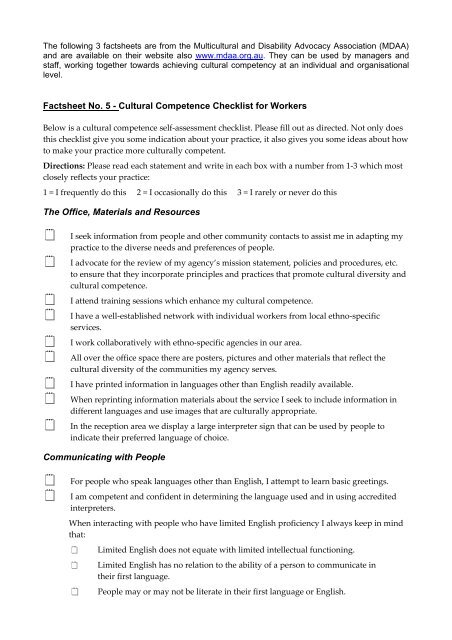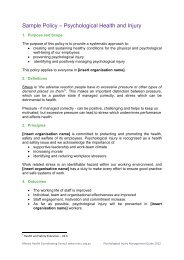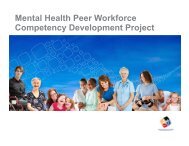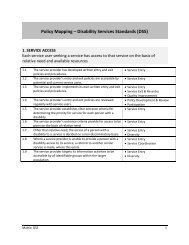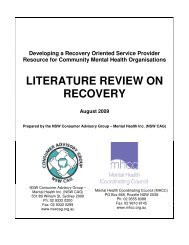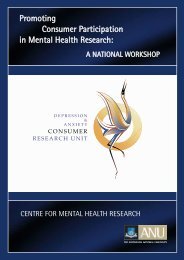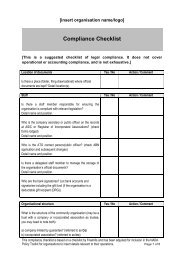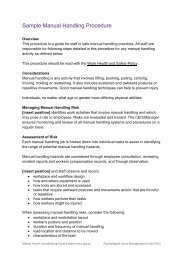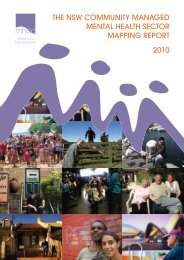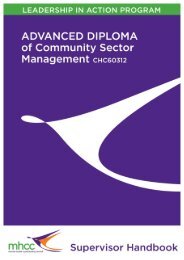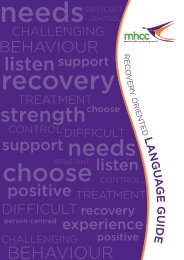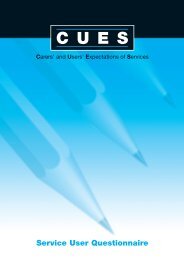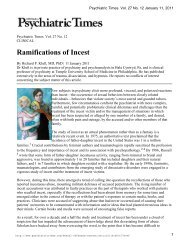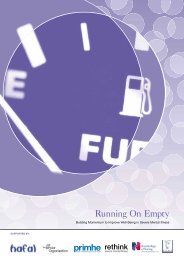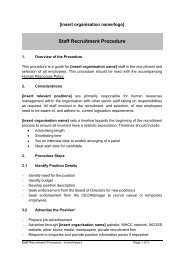cultural competence checklists for workers & agencies
cultural competence checklists for workers & agencies
cultural competence checklists for workers & agencies
You also want an ePaper? Increase the reach of your titles
YUMPU automatically turns print PDFs into web optimized ePapers that Google loves.
The following 3 factsheets are from the Multi<strong>cultural</strong> and Disability Advocacy Association (MDAA)<br />
and are available on their website also www.mdaa.org.au. They can be used by managers and<br />
staff, working together towards achieving <strong>cultural</strong> competency at an individual and organisational<br />
level.<br />
Factsheet No. 5 - Cultural Competence Checklist <strong>for</strong> Workers<br />
Below is a <strong>cultural</strong> <strong>competence</strong> self‐assessment checklist. Please fill out as directed. Not only does<br />
this checklist give you some indication about your practice, it also gives you some ideas about how<br />
to make your practice more <strong>cultural</strong>ly competent.<br />
Directions: Please read each statement and write in each box with a number from 1‐3 which most<br />
closely reflects your practice:<br />
1 = I frequently do this 2 = I occasionally do this 3 = I rarely or never do this<br />
The Office, Materials and Resources<br />
<br />
<br />
<br />
<br />
<br />
<br />
<br />
<br />
<br />
I seek in<strong>for</strong>mation from people and other community contacts to assist me in adapting my<br />
practice to the diverse needs and preferences of people.<br />
I advocate <strong>for</strong> the review of my agency’s mission statement, policies and procedures, etc.<br />
to ensure that they incorporate principles and practices that promote <strong>cultural</strong> diversity and<br />
<strong>cultural</strong> <strong>competence</strong>.<br />
I attend training sessions which enhance my <strong>cultural</strong> <strong>competence</strong>.<br />
I have a well‐established network with individual <strong>workers</strong> from local ethno‐specific<br />
services.<br />
I work collaboratively with ethno‐specific <strong>agencies</strong> in our area.<br />
All over the office space there are posters, pictures and other materials that reflect the<br />
<strong>cultural</strong> diversity of the communities my agency serves.<br />
I have printed in<strong>for</strong>mation in languages other than English readily available.<br />
When reprinting in<strong>for</strong>mation materials about the service I seek to include in<strong>for</strong>mation in<br />
different languages and use images that are <strong>cultural</strong>ly appropriate.<br />
In the reception area we display a large interpreter sign that can be used by people to<br />
indicate their preferred language of choice.<br />
Communicating with People<br />
<br />
<br />
For people who speak languages other than English, I attempt to learn basic greetings.<br />
I am competent and confident in determining the language used and in using accredited<br />
interpreters.<br />
When interacting with people who have limited English proficiency I always keep in mind<br />
that:<br />
<br />
<br />
<br />
Limited English does not equate with limited intellectual functioning.<br />
Limited English has no relation to the ability of a person to communicate in<br />
their first language.<br />
People may or may not be literate in their first language or English.
Values, Assumptions and Attitudes<br />
I explore my own values, beliefs, assumptions and attitudes about <strong>cultural</strong> diversity and<br />
how they impact on how I work with people using the service.<br />
<br />
<br />
<br />
<br />
<br />
<br />
<br />
I avoid imposing my values.<br />
In every situation, I discourage colleagues, service users and others from using racial and<br />
ethnic slurs by helping them understand the impact their language can have on others.<br />
I intervene in an appropriate manner when I observe other staff or service users engaging<br />
in behaviours that show <strong>cultural</strong> insensitivity or prejudice.<br />
I understand and accept that disability and responses to disability are defined differently<br />
by different cultures.<br />
I recognise and respect that some people may or may not want to have anything to do with<br />
their own culture or community.<br />
I understand and respect that factors such as gender, class, and age have different<br />
significance in different cultures.<br />
I understand and respect that religion and other beliefs may influence how people<br />
understand and respond to disability.<br />
If you frequently responded ‘1 ’, you are engaged in practices that recognise and<br />
promote <strong>cultural</strong> diversity and you aim to deliver a <strong>cultural</strong>ly competent service to<br />
people with disability.<br />
If you frequently responded ‘2’ or ‘3’ you may need to change your practices to respond<br />
more effectively and efficiently to the need of people from a NESB with disability<br />
For all the questions where you responded with ‘2’ or ‘3’ you might want to consider<br />
how you can change your practices to be more <strong>cultural</strong>ly competent.<br />
For more In<strong>for</strong>mation contact:<br />
Multi<strong>cultural</strong> Disability Advocacy Association of NSW (MDAA)<br />
Address PO Box 381, 40 Albion Street, Harris Park NSW 2150<br />
telephone (02) 9891 6400 or 1800 629 072 fax (02) 9635 5355 tty (02) 9687 6325<br />
e‐mail mdaa@mdaa.org.au website www.mdaa.org.au<br />
MDAA gratefully acknowledges the financial assistance provided by the Commonwealth Department of<br />
Family and Community Services and the NSW Department of Ageing, Disability and Home Care.
Factsheet No. 5 - Cultural Competence Checklist <strong>for</strong> Agencies<br />
Below is a <strong>cultural</strong> <strong>competence</strong> self‐assessment checklist. Please fill out as directed. Not only does<br />
this checklist give you some indication about your agency’s practices, it also gives you some ideas<br />
about how to make your agency more <strong>cultural</strong>ly competent.<br />
Directions: Please read each statement and write in each box with a number from 1‐3 which most<br />
closely reflects your agency’s practices:<br />
1 = We frequently do this 2 = We occasionally do this 3 = We rarely or never do this<br />
Inside the Agency<br />
The agency regularly evaluates the ethnic mix of its ‘service users’ against the ethnic mix of<br />
the target population.<br />
The agency’s mission statement, policies and procedures, etc. are regularly reviewed to<br />
ensure that they incorporate principles and practices that promote <strong>cultural</strong> diversity and<br />
<strong>cultural</strong> <strong>competence</strong>.<br />
The agency has a dedicated interpreter and translating budget line.<br />
The agency has trained all staff in the use of Telephone Interpreter Service.<br />
The agency sends staff to regular training to enhance their <strong>cultural</strong> <strong>competence</strong>.<br />
The agency has established an account with the Telephone Interpreter Service.<br />
The agency has planning processes which include action to enhance the <strong>cultural</strong><br />
<strong>competence</strong> of the agency.<br />
The agency has established per<strong>for</strong>mance targets to achieve service utilization rates which<br />
complement the <strong>cultural</strong> mix of its target population. In line with these per<strong>for</strong>mance targets<br />
the agency has a process <strong>for</strong> prioritising potential service users from a non‐English<br />
speaking background.<br />
The agency collects data in relation to service user’s <strong>cultural</strong>, linguistic and religious<br />
background and needs, and where appropriate the backgrounds of family members.<br />
The agency actively discourages staff, service users and others from using racial and ethnic<br />
slurs by helping them understand the impact their language can have on others.<br />
The agency has employment practices which encourage the employment of people from<br />
non‐English speaking backgrounds.<br />
The agency includes ‘demonstrated knowledge and experience in cross‐<strong>cultural</strong> issues’ as a<br />
criterion in job advertisements.<br />
The agency has clearly outlined policies and procedures <strong>for</strong> the use of interpreters and<br />
translators.<br />
The agency encourages people from non‐English speaking background to participate in the<br />
agency’s governing body.<br />
The agency has in place processes which identify <strong>cultural</strong>, linguistic or religious needs at<br />
the point of intake or initial assessment.
Resources, Outreach and Promotions<br />
The agency has a resource library that includes in<strong>for</strong>mation and resources about<br />
<strong>cultural</strong> diversity and disability issues.<br />
<br />
All over the office space there are posters, pictures and other materials that<br />
reflect the <strong>cultural</strong> diversity of the communities the agency serves.<br />
The agency has available printed in<strong>for</strong>mation in languages other than English.<br />
When reprinting in<strong>for</strong>mation the agency uses images that are <strong>cultural</strong>ly diverse<br />
and <strong>cultural</strong>ly appropriate.<br />
In the reception area the agency displays a large interpreter sign that can be used<br />
by people to indicate their preferred language of choice.<br />
The agency promotes its services to people from a non‐English speaking<br />
background.<br />
The agency liaises with ethnic community <strong>agencies</strong> in the target area.<br />
The agency has in place mechanisms <strong>for</strong> consultations with service users from<br />
non‐ English speaking background and the ethnic communities in the target<br />
areas.<br />
The agency has on display general in<strong>for</strong>mation pamphlets in a variety of<br />
languages.<br />
The agency uses <strong>cultural</strong>ly appropriate strategies when outreaching to ethnic<br />
communities.<br />
The agency develops links with ethnic communities and uses <strong>workers</strong> in those<br />
communities as <strong>cultural</strong> consultants when needed.<br />
If you frequently responded ‘1 ’, your agency is engaged in practices that<br />
recognise and promote <strong>cultural</strong> diversity and aims to deliver a <strong>cultural</strong>ly<br />
competent service to people with disability.<br />
If you frequently responded ‘2’ or ‘3’ your agency needs to change its practices<br />
to respond more effectively and efficiently to the needs of the <strong>cultural</strong>ly<br />
diverse community.<br />
For all the questions where you responded with ‘2’ or ‘3’ consider how you<br />
can change your agency’s practices to be more <strong>cultural</strong>ly competent.
For more In<strong>for</strong>mation contact:<br />
Multi<strong>cultural</strong> Disability Advocacy Association of NSW (MDAA)<br />
Address PO Box 381, 40 Albion Street, Harris Park NSW 2150<br />
telephone (02) 9891 6400 or 1800 629 072 fax (02) 9635 5355 tty (02) 9687<br />
6325<br />
e‐mail mdaa@mdaa.org.au website www.mdaa.org.au<br />
MDAA gratefully acknowledges the financial assistance provided by the Commonwealth<br />
Department of Family and Community Services and the NSW Department of Ageing,<br />
Disability and Home Care.
Factsheet No. 17 - Networking with NESB (non-English speaking<br />
backgrounds) communities: A practical guide<br />
Networking is about establishing relationships and building alliances with individuals, groups and<br />
organisations to share in<strong>for</strong>mation and skills and to undertake activities of mutual benefit.<br />
Networking is a key strategy <strong>for</strong> increasing the participation of people from a non‐English speaking<br />
background (NESB) with disability and their families in your services and programs.<br />
Networking:<br />
<br />
<br />
<br />
<br />
raises the profile of your organisation in the communities you are targeting;<br />
enables you to promote your services more effectively;<br />
provides you with access to <strong>cultural</strong>/religious in<strong>for</strong>mation, knowledge and expertise; and<br />
enables you to establish partnerships and work together to achieve common goals.<br />
1. Identify the NESB community/ies you want to target<br />
How: Consider: Resources to help you:<br />
The number of communities<br />
a) Refer to<br />
you target at any one time<br />
Factsheet 16:<br />
will depend on a range of<br />
Who lives in our<br />
factors including staff<br />
community<br />
numbers, resource<br />
Identifying community<br />
implications, intensity of<br />
diversity<br />
work, etc.<br />
2. Collect in<strong>for</strong>mation about the community<br />
Factsheet 16 is available from MDAA:<br />
phone (02) 9891 6400 or download<br />
http://www.mdaa.org.au/publications<br />
/faqs/index.html<br />
How:<br />
a) Access monographs<br />
and historical data<br />
b) Identify community<br />
leaders, key<br />
community<br />
organisations,<br />
Consider collecting the<br />
following in<strong>for</strong>mation:<br />
How long has the<br />
community lived in the area<br />
Any significant events in the<br />
history of the community<br />
What are some of the <strong>cultural</strong><br />
practices, traditions and<br />
rituals in the community<br />
What do we know about<br />
disability in the community<br />
Which groups, organisations<br />
exist in the area<br />
What are some places where<br />
members of the community<br />
Resources to help you:<br />
The following websites contain<br />
monographs on a number of ethnic<br />
communities residing in Australia.<br />
They have a particular focus on<br />
disability and culture:<br />
http://www.sttar.org/<br />
http://www.diversityrx.org/<br />
http://www.mdaa.org.au<br />
The Ethnic Communities Council<br />
of NSW (ECC) publishes the Ethnic<br />
Communities Reference Book. To<br />
obtain a copy contact:
community <strong>workers</strong>,<br />
and religious leaders<br />
and make a list<br />
3. Make contact<br />
may be contacted<br />
What services and resources<br />
exist in the community e.g.<br />
does the community have<br />
funded welfare and<br />
community <strong>workers</strong> Other<br />
active social or religious<br />
groups<br />
Who are the community<br />
leaders or key<br />
representatives<br />
Are there existing<br />
interagency networks you<br />
can tap into Where are<br />
they When do they meet<br />
For what purpose Who is<br />
the contact person<br />
Ethnic Communities Council of NSW<br />
221 Cope St. Waterloo NSW 2017<br />
ph: 02 93190288<br />
fax: 0293194229 or<br />
e‐mail: admin@eccnsw.org.au<br />
Most councils produce a directory<br />
of organisations working in their<br />
local government area (LGA). You<br />
can obtain a copy by contacting the<br />
relevant council or download it<br />
from its website.<br />
Ethno‐specific and multi<strong>cultural</strong><br />
health <strong>workers</strong>, bilingual and<br />
multilingual doctors (contact your<br />
local area health services to obtain<br />
a list).<br />
See the ECC’s Multi<strong>cultural</strong><br />
Interagency Directory 2006 at<br />
http://www.eccnsw.org.au/page=<br />
publications&id=37<br />
Migrant Resource Centres (MRCs).<br />
For contact details of MRCs in<br />
NSW and other states go to:<br />
http://www.immi.gov.au/grants/m<br />
rc_msa_b.htm<br />
Community Relations Commission<br />
For a multi<strong>cultural</strong> NSW website:<br />
http://www.crc.nsw.gov.au<br />
How: Consider: Resources to help you:<br />
a) Plan the contact<br />
Developing a short<br />
introduction about your<br />
organisation, your role, and<br />
purpose of contacting<br />
individual/group.<br />
b) Organise a face‐toface<br />
meeting if<br />
appropriate<br />
Making contact by telephone<br />
initially and arrange meeting<br />
Determining whether an<br />
interpreter is needed and<br />
Contact MDAAʹs training arm<br />
ʺ<strong>cultural</strong> abilitiesʺ <strong>for</strong> training on:<br />
How to Use Interpreters and Working<br />
X‐<strong>cultural</strong>ly.<br />
Check out the training calendar on<br />
MDAAʹs website <strong>for</strong> more<br />
in<strong>for</strong>mation:<br />
http://www.mdaa.org.au/training.h<br />
tml
arrange as necessary<br />
c) Prepare an agenda<br />
Being clear about your<br />
objectives <strong>for</strong> the meeting;<br />
what you can offer; whatʹs in<br />
it <strong>for</strong> you/the contact.<br />
Getting some training in<br />
cross‐<strong>cultural</strong><br />
communication.<br />
d) Have the meeting<br />
Are you able to use<br />
interpreters effectively<br />
Is your proposed meeting<br />
approach/style <strong>cultural</strong>ly<br />
sensitive and appropriate<br />
Was your presentation style <strong>cultural</strong>ly sensitive and appropriate<br />
How do you know<br />
e) Reflect/Evaluate<br />
f) Attend existing<br />
inter<strong>agencies</strong>/<br />
networks if relevant<br />
What were the outcomes of the meeting: <strong>for</strong> you For your<br />
organisation For the contact Do you need to follow‐up any issues<br />
What went well What didnʹt go well What do you need to change<br />
Get in touch with the contact person and ask to be placed on the<br />
agenda and/or mailing list<br />
4. Maintain your networks<br />
How:<br />
a) Follow‐up<br />
b) Build ongoing<br />
relationships<br />
Consider:<br />
Telephone contact and thank them <strong>for</strong> meeting (if appropriate)<br />
If youʹve promised to send something do so<br />
Explore opportunities <strong>for</strong> partnership projects<br />
Identify other strategies to maintain networks established<br />
5. Share in<strong>for</strong>mation gathered with your team/organisation<br />
How:<br />
a) Use existing team<br />
meetings, intranet etc<br />
Consider:<br />
Provide a presentation to your team<br />
Create a folder on your computer network/in your library to store<br />
in<strong>for</strong>mation gathered
For more In<strong>for</strong>mation:<br />
Multi<strong>cultural</strong> Disability Advocacy Association of NSW (MDAA)<br />
Address PO Box 9381, 40 Albion Street, Harris Park NSW 2150<br />
telephone (02) 9891 6400 or 1800 629 072 fax (02) 9635 5355 tty (02) 9687<br />
6325<br />
e‐mail mdaa@mdaa.org.au website www.mdaa.org.au<br />
MDAA gratefully acknowledges the financial assistance provided by the Commonwealth<br />
Department of Family and Community Services and the NSW Department of Ageing,<br />
Disability and Home Care.


